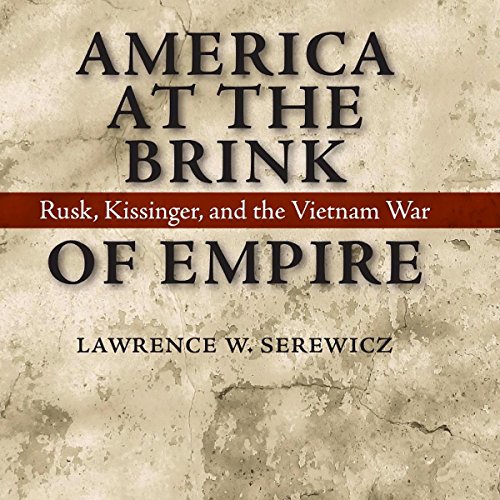
America at the Brink of Empire
Rusk, Kissinger, and the Vietnam War (Political Traditions in Foreign Policy Series)
Artikel konnten nicht hinzugefügt werden
Der Titel konnte nicht zum Warenkorb hinzugefügt werden.
Der Titel konnte nicht zum Merkzettel hinzugefügt werden.
„Von Wunschzettel entfernen“ fehlgeschlagen.
„Podcast folgen“ fehlgeschlagen
„Podcast nicht mehr folgen“ fehlgeschlagen
Nur 0,99 € pro Monat für die ersten 3 Monate + 15 € Audible-Guthaben
 Bist du Amazon Prime-Mitglied?
Bist du Amazon Prime-Mitglied?Audible 60 Tage kostenlos testen
Für 20,95 € kaufen
-
Gesprochen von:
-
Randal Schaffer
-
Von:
-
Lawrence W. Serewicz
Über diesen Titel
Addressing issues of continuing if not heightened relevance to contemporary debate, America at the Brink of Empire explores the foreign policy leadership of Dean Rusk and Henry Kissinger regarding the extent of the United States' mission to insure a stable world order. Lawrence W. Serewicz argues that in the Vietnam conflict the United States experienced an identity crisis - a near Machiavellian moment - whereby America came close to assuming an imperial role, stretching the country to the limits of its identity as a republic. Serewicz offers a revealing look at the parts played by Rusk and Kissinger - and President Lyndon Johnson - in bringing the nation to the brink of empire in the years 1963-75.
As a true believer in liberal internationalism, Rusk set the stage by defining the war in Vietnam as a threat to the world order based on the United Nations security system created after World War II. Johnson kept an open-ended commitment in Vietnam without a clear goal in sight even as he pursued the ambitious domestic reforms of the Great Society. In refusing to choose between either an imperial mission or a true republican position for the nation, he brought it perilously close to becoming an empire, ultimately failing to achieve his goals either at home or abroad. Kissinger corrected for Johnson's overreach, implementing a pragmatic realism based upon the principle that the United States is an ordinary country - a republic, not an empire - within the international community and therefore must balance its commitments with its resources.
In concluding, Serewicz reflects on the continuing relevance of the Machiavellian moment for the United States by observing the differences and similarities between the presidencies of Johnson and George W. Bush.
The book is published by Louisiana State University Press.
©2007 Louisiana State University Press (P)2017 Redwood Audiobooks



